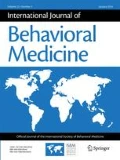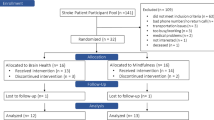Abstract
Sleep disturbance is a very common problem for cancer patients that has largely not been addressed in the clinical intervention literature. Mindfulness meditation has demonstrated clinical benefits for a variety of patient populations in other areas of functioning. This study examined the effects of an 8-week Mindfulness-Based Stress Reduction (MBSR) program on the sleep quality of a heterogeneous sample of 63 cancer patients. Overall sleep disturbance was significantly reduced (p < .001) and participants reported that their sleep quality had improved (p < .001). There was also a significant reduction in stress (p < .001), mood disturbance (p = .001), and fatigue (p < .001). The associations among these changes and implications for improving quality of life of cancer patients are discussed.
Similar content being viewed by others
References
Ancoli-Israel, S., Moore, P. J., & Jones, V. (2001). The relationship between fatigue and sleep in cancer patients: A review. European Journal of Cancer Care, 10, 245–255.
Barnes, E. A., & Bruera, A. (2002). Fatigue in patients with advanced cancer: A review. International Journal of Gynecological Cancer, 12, 424–428.
Beck, S. L., Schwartz, A. L., Towsley, G., Dudley, W., & Barsevick, A. (2004). Psychometric evaluation of the Pittsburgh Sleep Quality Index in cancer patients. Journal of Pain and Symptom Management, 27, 140–148.
Berger, A. (2003). Treating fatigue in cancer patients. Oncologist, 8 Suppl 1, 10–14.
Berger, A. M., & Higginbotham, P. (2000). Correlates of fatigue during and following adjuvant breast cancer chemotherapy: A pilot study. Oncology Nursing Forum, 27, 1443–1448.
Bishop, S. R., Lau, M. A., Shapiro, S. L., Carlson, L. E., Anderson, N. D., Carmody, J. F., et al. (2004). Mindfulness: A proposed operational definition. Clinical Psychology: Science and Practice, 11, 230–241.
Buysse, D. J., Reynolds, C. F., III, Monk, T. H., Berman, S. R., & Kupfer, D. J. (1989). The Pittsburgh Sleep Quality Index: A new instrument for psychiatric practice and research. Psychiatry Research, 28, 193–213.
Carlson, L. E., Angen, M., Cullum, J., Goodey, E., Koopmans, J., Lamont, L., et al. (2004). High levels of untreated distress and fatigue in cancer patients. British Journal of Cancer, 90, 2297–2304.
Carlson, L. E., Speca, M., Patel, K. D., & Goodey, E. (2003). Mindfulness-based stress reduction in relation to quality of life, mood, symptoms of stress, and immune parameters in breast and prostate cancer outpatients. Psychosomatic Medicine, 65, 571–581.
Carlson, L. E., Ursuliak, Z., Goodey, E., Angen, M., & Speca, M. (2001). The effects of a mindfulness meditation based stress reduction program on mood and symptoms of stress in cancer outpatients: Six month follow-up. Supportive Care in Cancer, 9, 112–123.
Carpenter, J. S., & Andrykowski, M. A. (1998). Psychometric evaluation of the Pittsburgh Sleep Quality Index. Journal of Psychosomatic Research, 45, 5–13.
Cella, D., Davis, K., Breitbart, W., & Curt, G. (2001). Cancer-related fatigue: Prevalence of proposed diagnositic criteria in a United States sample of cancer survivors. Journal of Clinical Oncology, 19, 3385–3391.
Courneya, K. S., Friedenreich, C. M., Sela, R. A., Quinney, H. A., Rhodes, R. E., & Handman, M. (2003). The group psychotherapy and home-based physical exercise (group-hope) trial in cancer survivors: Physical fitness and quality of life outcomes. Psycho-Oncology, 12, 357–374.
Engstrom, C. A., Strohl, R. A., Rose, L., Lewandowski, L., & Stefanek, M. E. (1999). Sleep alterations in cancer patients. Cancer Nursing, 22, 143–148.
Hall, M., Baum, A., Buysse, D. J., Prigerson, H. G., Kupfer, D. J., & Reynolds, C. F., III (1998). Sleep as a mediator of the stress-immune relationship. Psychosomatic Medicine, 60, 48–51.
Hall, M., Buysse, D. J., Nowell, P. D., Nofzinger, E. A., Houck, P., Reynolds, C. F., III, et al. (2000). Symptoms of stress and depression as correlates of sleep in primary insomnia. Psychosomatic Medicine, 62, 227–230.
Kabat-Zinn, J. (1990). Full catastrophe living: Using the wisdom of your body and mind to face stress, pain and illness. New York: Delacourt.
Kabat-Zinn, J., Lipworth, L., & Burney, R. (1985). The clinical use of mindfulness meditation for the self-regulation of chronic pain. Journal of Behavioral Medicine, 8, 163–190.
Kaplan, K. H., Goldenberg, D. L., & Galvin-Nadeau, M. (1993). The impact of a meditation-based stress reduction program on fibromyalgia. General Hospital Psychiatry, 15, 284–289.
Koopman, C., Nouriani, B., Erickson, V., Anupindi, R., Butler, L. D., Bachmann, M. H., et al. (2002). Sleep disturbances in women with metastatic breast cancer. The Breast Journal, 8, 362–370.
Lavidor, M., Weller, A., & Babkoff, H. (2003). How sleep is related to fatigue. British Journal of Health Psychology, 8, 95–105.
Leckie, M. S. & Thompson, E. (1979). Symptoms of stress inventory. Seattle: University of Washington.
Malone, M., Harris, A. L., & Luscombe, D. K. (1994). Assessment of the impact of cancer on work, recreation, home meanagement and sleep using a general health status measure. Journal of the Royal Society of Medicine, 87, 386–389.
McNair, D. A., Lorr, M., & Droppelman, L. F. (1971). Profile of mood states. San Diego, CA: Educational and Industrial Testing Service.
Mendoza, T. R., Wang, X. S., Cleeland, C. S., Morrissey, M., Johnson, B. A., Wendt, J. K., et al. (1999). The rapid assessment of fatigue severity in cancer patients: Use of the Brief Fatigue Inventory. Cancer, 85, 1186–1196.
Miller, J. J., Fletcher, K., & Kabat-Zinn, J. (1995). Three-year follow-up and clinical implications of a mindfulness meditation-based stress reduction intervention in the treatment of anxiety disorders. General Hospital Psychiatry, 17, 192–200.
Reibel, D. K., Greeson, J. M., Brainard, G. C., & Rosenzweig, S. (2001). Mindfulness-based stress reduction and health-related quality of life in a heterogeneous patient population. General Hospital Psychiatry, 23, 183–192.
Savard, J., Miller, S. M., Mills, M., O’Leary, A., Harding, H., Douglas, S., et al. (1999). Association between subjective sleep quality and depression on immunocompetence in low-income women at risk for cervical cancer. Psychosomatic Medicine, 61, 496–507.
Savard, J., & Morin, C. M. (2001). Insomnia in the context of cancer: A review of a neglected problem. Journal of Clinical Oncology, 19, 895–908.
Savard, J., Simard, S., Blanchet, J., Ivers, H., & Morin, C. M. (2001). Prevalence, clinical characteristics, and risk factors for insomnia in the context of breast cancer. Sleep, 24, 583–590.
Schwartz, A. L. (2000). Daily fatigue patterns and effect of exercise in women with breast cancer. Cancer Practice, 8, 16–24.
Schwartz, A. L., Mori, M., Gao, R., Nail, L. M., & King, M. E. (2001). Exercise reduces daily fatigue in women with breast cancer receiving chemotherapy. Medicine & Science in Sports & Exercise, 33, 718–723.
Shapiro, S. L., Astin, J. A., & Carlson, L. E. (2004) Mechanisms of mindfulness: A new way of seeing. Psychological Review.
Shapiro, S. L., Bootzin, R. R., Figueredo, A. J., Lopez, A. M., & Schwartz, G. E. (2003). The efficacy of mindfulness-based stress reduction in the treatment of sleep disturbance in women with breast cancer: An exploratory study. Journal of Psychosomatic Research, 54, 85–91.
Speca, M., Carlson, L. E., Goodey, E., & Angen, M. (2000). A randomized, wait-list controlled clinical trial: The effect of a mindfulness meditation-based stress reduction program on mood and symptoms of stress in cancer outpatients. Psychosomatic Medicine, 62, 613–622.
Tacon, A. M. (2003). Meditation as a complementary therapy in cancer. Family Community Health, 26, 64–73.
Weissbecker, I., Salmon, P., Studts, J. L., Floyd, A. R., Dedert, E. A., & Sephton, S. E. (2002). Mindfulness-based stress reduction and sense of coherence among women with fibromyalgia. Journal of Clinical Psychology in Medical Settings, 9, 297–307.
Yellen, S. B., Cella, D. F., Webster, K., Blendowski, C., & Kaplan, E. (1997). Measuring fatigue and other anemia-related symptoms with the Functional Assessment of Cancer Therapy (FACT) measurement system. Journal of Pain and Symptom Management, 13, 63–74.
Author information
Authors and Affiliations
Corresponding author
Additional information
Dr. Linda Carlson is funded by a Canadian Institutes of Health Research New Investigator Award. We would like to thank all of the participants in the MBSR program who have diligently completed questionnaires, and encourage their quest for healing and personal growth.
Rights and permissions
About this article
Cite this article
Carlson, L.E., Garland, S.N. Impact of mindfulness-based stress reduction (MBSR) on sleep, mood, stress and fatigue symptoms in cancer outpatients. Int. J. Behav. Med. 12, 278–285 (2005). https://doi.org/10.1207/s15327558ijbm1204_9
Issue Date:
DOI: https://doi.org/10.1207/s15327558ijbm1204_9




